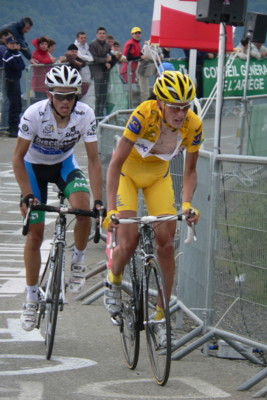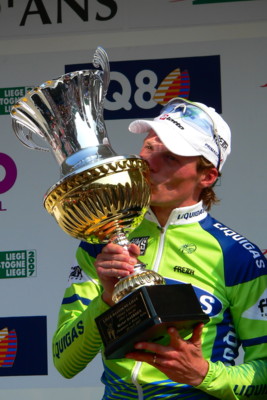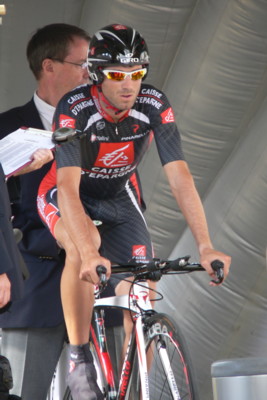|
17.08.2007/The organizers of the Hamburg Cyclassics do not want to see Danilo Di Luca, Allan Davis, Michael Rasmussen and
Alberto Contador on the startlist of their race. Managing director Frank Bertels told German newsagency DPA that he doesn't
want to see any riders who are under suspicion or are involved in a "pending [doping] case". Yet Erik Zabel, who
has confessed to have taken performance enhancing drugs in the nineties, will be allowed to start. A call for fairness by
cyclingheroes.

|
| Contador and Rasmussen: unconvicted, yet unwanted (picture: Cyclingheroes) |
Earlier this week the head of the organizing committee of this years world championships in Stuttgart, Sussane Eisenmann,
told reporters that she does not want to see Alejandro Valverde and Erik Zabel at this years world championships.
The so called Code de Conduit of the Pro-Tour teams was already problematic under the rule of law in western societies.
Normally the accuser has to proof his accusations in our juridical system, but the code de conduit made it possible to ban
riders without a conviction of a federation or sports court. Now German race organizers started to ban riders who are not
(yet?) convicted as well. Where does that leave us?
This editiorial is not about riders being guilty or not, its about the rule of law. The UCI and WADA rules are clear:
If a rider tested positive or if anti-doping authorities can proof that a rider doped or attempted to dope he has to be banned
for two years if it is for the first time, and for the rest of is life if it is the second offence.
Alberto Contador, Danilo Di Luca, Alejandro Valverde, Michaeel Rasmussen and Allan Davis are not found guilty by anti-doping
authorities. While the Italian Olympic Committee (CONI) is still investigating Giro d'Italia winner Danilo Di Luca, the state
prosecution of Pescara has already filed the case. Although all these rides are not convicted of anything they are not welcomed
at certain race. On the other hand Erik Zabe,l who has admitted that he took performance enhancing drugs, is allowed to start
in Hamburg. Does that make sense? Does that follow any logic? Is this effective anti-doping policy? Or is this just arbitrariness
the Pro Tour was meant to end?

|
| Danilo Di Luca: unconvicted, yet unwanted (picture Cyclingheroes) |
The fight against doping is important. If riders break the rules they should be punished. But the rules should applyl for
everybody. If race organizers don't care about the rules by ignoring the fact that a rider is not convicted or that there
is not even a case being opened against him (as in the Rasmussen case) we have to ask a few questions. No longer playing by
the rules won't help the fight against doping, it will undermine it. It will destroy the sport. Pro Tour regulations are not
only for riders but for race organizers too.
From the beginning the Puerto affair has not been dealt with competently. Instead of analyzing the reason for what conclusion
to draw for the future, all parties seem to act solely for the sake of acting. In an international peloton the UCI should
consider to let international cases like Puerto, being handled by an international body to the effect that all riders are
being treated equally. The current situation is just unfair: Some riders under suspicion are banned for more than a year now,
others have never been banned and can continue to race. Single race organizers who exdlude riders from whom they think they
are under suspicion cannot be the solution, they will make things worse.
What if Danilo Di Luca wants to start at the Cyclassics and he isn't allowed to without being banned? Just a theory: Di
Luca wants to start and isn't allowed to. In the coming months he could be cleared by CONI and at the end of the season Di
Luca could be second at the Pro-Tour rankink because he could not grab a few points in Hamburg. After this years Tour de France
it could be the second important competition with a result which is influenced because a rider was sent home or couldn't even
start who was not convicted by any anti-doping authorities. It turns races into a farce. Can it be the solution to fight
doping by creating another farce? No!
In this climate it shouldn't surprise anybody that sponsors are not exactly eager to finance a pro team. They can't be
sure that the rules are being followed by anybody. No gurantees anywhere. Even the UCI doesn't seem to care about their own
rules. Unibet.com was granted a Pro-Tour license by the UCI and still wasn't allowed to start at many of the major races.
The license has been paid by the millions and it turned out to be completely worthless public relations wise. The company
invested millions into the team and planned to invest even more in the coming three years. Understandably unibet.com decided
to stop at the end of the season.

|
| Alejandro Valverde: unconvicted, yet unwanted (picture: Cyclingheroes) |
Related stories:
Other stories
|

